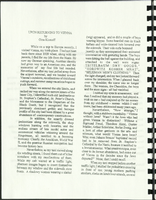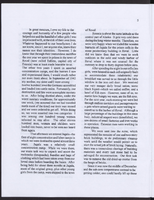Search the Special Collections and Archives Portal
Search Results

Transcript of interview with Ed Fleming by Mark Lucas, February 8, 1977
Date
Archival Collection
Description
On February 8, 1977, Mark Lucas interviewed Edmund “Ed” Fleming (born 1915 in Virginia, Minnesota) about his experience in Southern Nevada. Fleming first talks about his moves to and from Nevada before describing the mining practices within the small towns in Southern Nevada. He also talks about his experience as a teacher in Pahrump and Goodsprings and his eventual move to Las Vegas, where he continued in the educational field. Fleming also talks about religion, transportation, funding for education, inflation, and cultural arts as they all relate to Las Vegas.
Text

Compilation of writings from the Holocaust Survivors' Group, circa 1998
Date
Archival Collection
Description
Bound compilation of four issues of the Holocaust Survivors' Group essays and poems.
Text
Julius Jensen Professional Papers
Identifier
Abstract
The Julius Jensen Professional Papers (1630-1979) consist of medical research notes, medical journal reprints, manuscript and article drafts, professional and personal correspondence, business and financial records, investment information, travel information, photographic prints, art prints, and collectible books and magazines.
Archival Collection
Liberty Engine Company No. 1 Records
Identifier
Abstract
The Liberty Engine Company No. 1 Records (1876-1927) consist of two accounting ledgers belonging to the Liberty Engine Company No. 1, the fifth volunteer fire company formed in Gold Hill, Nevada in 1868. One ledger is signed by a the wife of J. H. (John H.) Witte, who was listed in an 1880 edition of the Gold Hill Daily News as a member of the Liberty Engine Company No. 1. The collection also contains banking transactions dating from 1926 to 1927 and a handwritten account of various payments made to the heirs of a Mrs. S. K. Witte in 1906. Some items in this collection are digital surrogates.
Archival Collection
Aplin Family Scrapbooks
Identifier
Abstract
The Aplin Family Scrapbooks (1927-1971) consists of four handmade scrapbooks compiled by Hilda Aplin. The scrapbooks contain photographs, correspondence, newspaper clippings, and handwritten captions. The majority of the collection focuses on Hilda and Charles Aplin’s involvement in the Fraternal Order of Eagles and Las Vegas Eagles Auxiliary #1213. Also included is a photograph album that details the family’s activities from 1927 to 1959, including notable locations around Las Vegas, Nevada such as Lake Mead, Hoover Dam, Mt. Charleston, and annual Helldorado parades.
Archival Collection
Walking Box Ranch Collection
Identifier
Abstract
The Walking Box Ranch Collection (1917-2011) includes material collected by the University of Nevada, Las Vegas (UNLV) Public Lands Institute on the Searchlight, Nevada ranch. Materials include a maps related to the construction and operation of the ranch, a pair of chaps owned by Rex Bell, Jr., and color slides of the ranch. Also included are photographic prints of Rex Bell and Rex Bell, Jr., and newsclippings related to the film and political career of Rex Bell. A small number of newsclippings pertain to the career of Rex Bell, Jr.
Archival Collection
Flora Dungan Papers
Identifier
Abstract
Flora Dungan Papers (1929-1974) contain high school and university records, certificates, newspaper clippings, press releases, notes, correspondence, and booklets about her life and political activism in Nevada. Also included are Legislative materials, an audio cassette tape, a copy of the Nevada Constitution, and an oil painting of Flora Dungan.
Archival Collection

University of Nevada, Las Vegas (UNLV) 41st commencement program
Date
Archival Collection
Description
Commencement program from University of Nevada, Las Vegas Commencement Programs and Graduation Lists (UA-00115).
Text

Transcript of interview with Virginia Beckly Richardson by Claytee D. White and Carole C. Terry, November 5, 2009
Date
Archival Collection
Description
Through her oral interview and the materials she provided, Virginia Beckley Richardson gives us a unique and fascinating look at both a pioneer family of Las Vegas and the early activities of the Service League, the forerunner of the Junior League of Las Vegas. Her personal recollections are an insight into life in the city's early years, and the biography of her father written by her brother, Bruce, humanizes a prominent figure in Las Vegas' history. The newspaper articles she made available enhance her descriptions of the Service League's activities. In addition, the article, "Merchant's Home Becomes Monument," describes her family home originally located on Fourth Street and relocated by the Junior League of Las Vegas in 1979. Her recollections clearly demonstrate her enthusiasm about her family's accomplishments and her involvement in the Service League
Text

